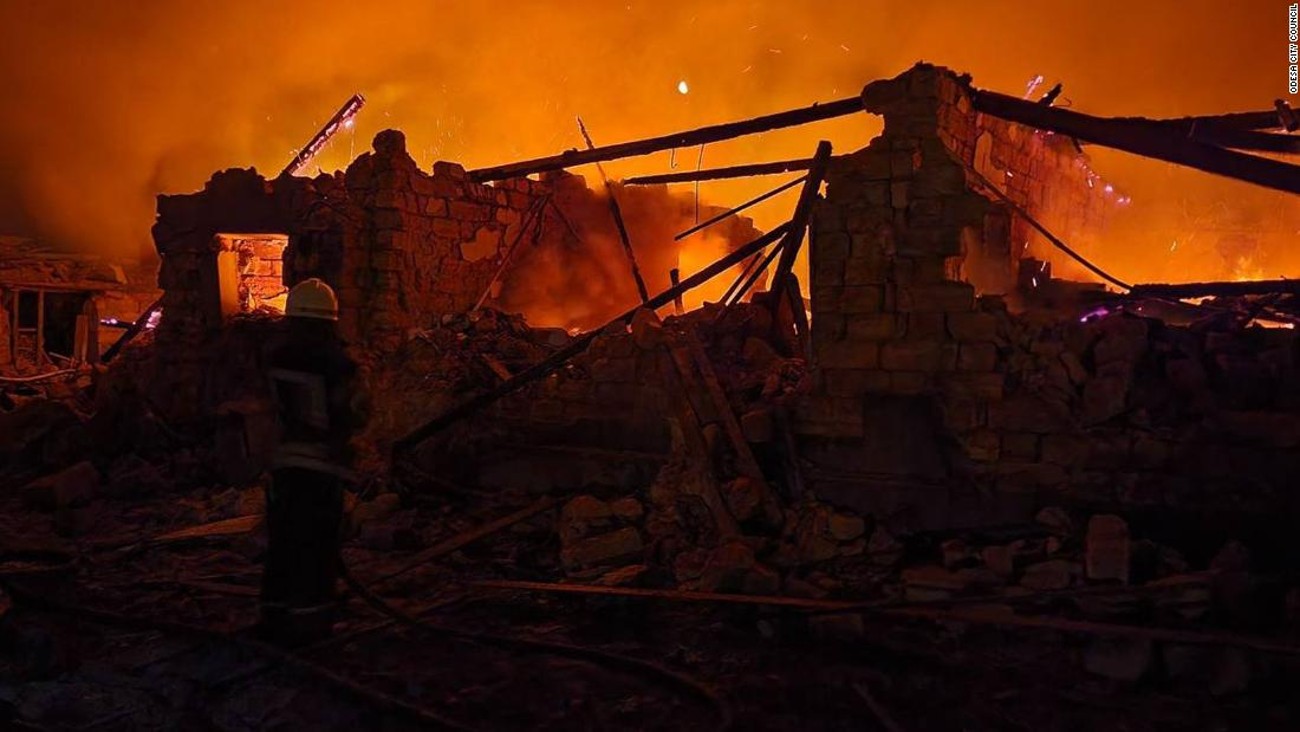Russia breaks agreement with Ukraine by attacking Odessa 3:08
Kyiv, Ukraine (CNN) --
United Nations chief Antonio Guterres seemed both relieved and worried when the grain export deal he negotiated was signed in Istanbul last Friday.
Immediately after it was signed by Russia, Ukraine and the intermediary Turkey, the UN secretary-general said the deal offered a "beacon of hope", heralding food relief for the developing world.
Unfortunately for Guterres and everyone with much-needed food, his months of diplomatic work — including visits to Moscow and Kyiv to finalize the deal — exposed the limitations of trusting Russia.
The agreement does not include an explicit ceasefire, but Russia's obligations are clearly defined: "The Russian Federation has committed to facilitating the unhindered export of food, sunflower oil and fertilizers," said a statement from Guterres' office. .
Latest news from the war: what will happen to Ukrainian grains after Russia's attack on Odessa
Less than 24 hours after it was signed, the post-agreement calm in Odessa — the main port mentioned in the agreement — was shattered when two sea-launched Russian Kalibr cruise missiles crashed into the port.
The windows of the buildings flew over a thousand meters.
Firefighters went to the port to put out the flames of several burning boats.
According to authorities, a port worker was injured.
advertising
The damage could have been much worse;
two more of the $6 million precision missiles had been shot down by Ukraine's air defense.
Bathers in Odessa, who last year were vying for places in the sand with Russian vacationers, cheered when the interception detonated above their heads.
Russia's apparent breach of the grain deal it had signed was deplored by Ukraine and its allies, and widely seen as proof of its duplicity.
Speaking to CNN just hours after the attack, Ukrainian MP Oleksiy Goncharenko said Russia was "showing that it wants to continue to threaten the world's food security."
Ukraine has 120 days to export grains 1:35
"The attack casts serious doubt on the credibility of Russia's commitment," US Secretary of State Antony Blinken said, adding that it "undermines the work of the UN, Turkey and Ukraine to bring critical food to world markets." ".
"It shows that not one word [of Russian President Vladimir Putin] can be trusted," said Liz Truss, the UK's foreign secretary and potential future prime minister.
Surprisingly, Russia's initial response to reports of the attack was denial.
According to Turkey - a co-signer of the agreement and an arbiter overseeing its safe and fair application - the Kremlin told Ankara "in no uncertain terms" that it had "nothing to do with this attack".
However, just 12 hours later, Russian Foreign Ministry spokeswoman Maria Zakharova reversed the initial lie.
She said these were Russian attacks after all and claimed the bombardment had wiped out Ukrainian "military infrastructure" in the port.
Ukraine said the attacks hit a pumping station in the port of Odessa.
This kind of obfuscation is common among Russian officials, and that's what it's all about.
The grain deal has changed nothing in Moscow's calculus to fight the war, despite all of Guterres' hard work and diplomatic improvement.
And the damage done here is not just to remind the world of Moscow's ambiguous relationship to the truth.
Russia has also burned the good faith of its broker in the deal, Turkey.
Under the terms of the agreement, Turkey is setting up a Joint Command Center (JCC) with UN help to monitor compliance.
But Russia has already torpedoed all trust, in keeping with its cynical approach to the entire war against Ukraine.
The Russian invasion of one of the world's breadbaskets has caused global food insecurity, but Moscow obtained concessions through the deal to allow the flow of grain from Ukraine.
That is usually called extortion.
To get Russia to free up grain by ending blockades on Ukrainian ports, Guterres had to strike a side deal with Russia, effectively easing some sanctions on food and fertilizer.
UN officials explained the diplomacy as "based on the principle that the measures imposed on the Russian Federation do not apply to these products."
Why did Russia attack and invade Ukraine?
What are the reasons and the origin of the conflict?
Removing those sanctions will add money to Moscow's coffers, perhaps the most lasting result of the Guterres deal: Putin will make limited commitments in exchange for money.
But in doing so, Putin perhaps revealed, like Tolkien's Smaug, a potentially fatal vulnerability in his defenses.
The mythical dragon's weakness was the lack of a balance, and Putin's seems to be the economic bite of international sanctions.
Whatever his other reasons for accepting the deal, the need to pay for the war probably carries the most weight.
Speaking in Istanbul after Saturday's missile attack, Ukraine's Deputy Infrastructure Minister Yurii Vaskov said technical meetings were under way to implement the deal.
"Ukraine is determined to start grain export as soon as possible," he said.
Russia's "attack is also on the agenda," Vaskov added.
Guterres was right to be hopeful;
the future effectiveness of the UN Security Council depends on its ability to prevent Russia from escalating its war.
But if he was wary at the signing table on Friday, nothing he's seen so far will reassure him.
For example, Russian Foreign Minister Sergei Lavrov embellished the deal on Sunday, saying Russian ships would help escort the freighters.
A statement, just like the missile attack, deliberately aimed at provoking Ukraine.
war in ukraine

